Dell XPS 15 L521X: A Detailed First Look
by Jarred Walton on July 25, 2012 1:10 AM ESTDell XPS 15 General Performance
We start as usual with our general performance application benchmarks. We’re reaching the point where we now have quite a few notebooks in our updated Mobile Benchmark suite, and we’ve tried to select some reasonable comparison points. Given the preliminary nature of our benchmark results (i.e. potential for CPU and/or GPU throttling), we have not yet added the XPS 15 to Mobile Bench, but we will do so when we have a final release BIOS that addresses our throttling concerns. Here’s the list of laptops we’ll be using for our charts, along with a brief overview of their specs. The full specs for each laptop can be found in their respective reviews, which we’ve linked in the table below.
| Laptop Configuration Overview | ||||
| Laptop | CPU | Graphics | Storage | Battery |
| Acer Aspire V3-571G | Intel i7-3610QM | GT640M/HD4000 | HDD | 48Wh |
| Acer Aspire S5 | Intel i7-3517U | HD4000 | SSD | 35Wh |
| Acer TimelineU M3 | Intel i7-2637M | GT640M/HD3000 | SSD | 55Wh |
| AMD Trinity Prototype | AMD A10-4600M | HD7660G | SSD | 56Wh |
| ASUS N56VM (Prerelease) | Intel i7-3720QM | GT630M/HD4000 | HDD/SSD | 56Wh |
| ASUS G74SX-A2 | Intel i7-2630QM | GTX560M/HD3000 | SSD | 90Wh |
| Clevo W110ER | Intel i7-3720QM | GT650M/HD4000 | Hybrid (Seagate) | 62Wh |
| Dell XPS 15 (L521x) | Intel i7-3612QM | GT640M/HD4000 | Hybrid (SRT) | 65Wh |
| Razer Blade | Intel i7-2640M | GT555M/HD3000 | SSD | 60Wh |
| Sony VAIO SE | Intel i7-2640M | HD6630M/HD3000 | HDD | 49Wh |
| Toshiba P755D | AMD A8-3520M | HD6620G | HDD | 47Wh |
We have quite a few SSD-equipped laptops in our list, which will mostly influence PCMark results. The Dell XPS 15 we’re reviewing marks the first time—and certainly won’t be the last!—we’ve had a laptop arrive with support for Intel’s Smart Response Technology. Previously SRT was only available with the desktop Z68 chipset, but with the new Ivy Bridge Panther Point chipsets (see the chipset table at the bottom of our IVB Ultrabook review) laptops with 7-series chipsets (excluding the HM76) all support SRT. Dell uses a Samsung P830 32GB mSATA SSD for SRT caching, and we enabled the higher performing “Maximized” mode with write-back caching as opposed to the lower performing “Enhanced” mode with write-through caching. There is an increased risk of data loss in the event of hardware removal or failure, but HDD removal is highly unlikely to occur on the XPS 15 and in the case of hardware failure there’s already a high chance of data loss. (We always recommend users back up, and back up often!) Note that a system crash doesn’t cause data loss—the Intel BIOS hooks detect an improper shutdown with “unsaved” data in the SSD cache, and that data is then committed to the hard drive on the next boot—it’s actually quite slick.
The other hybrid storage solution that we’ve seen more often is Seagate’s Momentus XT, which has an 8GB cache that AFAIK only functions in write-through caching mode. Going forward, we’ll also see some laptops using alternative caching schemes like Diskeeper/Condusiv Technologies’ ExpressCache software. I do have a laptop undergoing testing right now with an 8GB ExpressCache implementation, and it appears to be less performant than a 32GB SRT cache, but given the discrepancy in SSD size it’s difficult to come to any firm conclusion at this point.
Now let’s get to the benchmark results, starting with PCMark. We ran the XPS 15 in both IGP and dGPU modes, as the presence/lack of Intel’s Quick Sync technology can have a sizeable impact on overall performance according to this metric. We’ve used the best score for each chart on previously testing laptops (e.g. IGP for the Computation results). The XPS 15 results are in green, with the similarly equipped Acer V3-571G results in yellow. We also have results for the ASUS N56VM/N56VZ prototype with both HDD and SSD (light blue) storage, so you can get a feel for the range of performance that the storage solution creates. Note that while the overall design is highly reminiscent of Apple’s current MacBook Pro 15, we do not have current MBP15 Boot Camp results—and anecdotally it appears there is very little cross shopping; people either want an MBP with OS X, or something else with Windows. If/when Anand or Vivek gets around to testing the latest MacBooks with Windows, we’ll add the results to Mobile Bench.
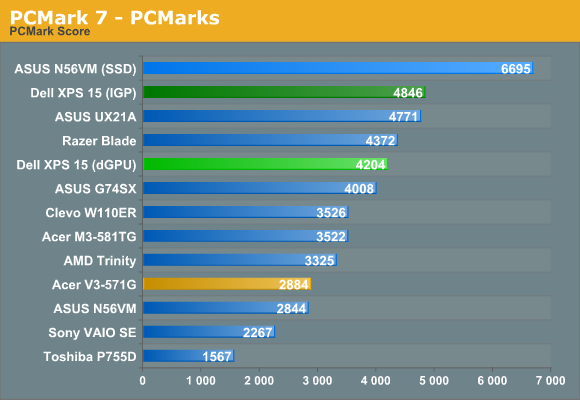
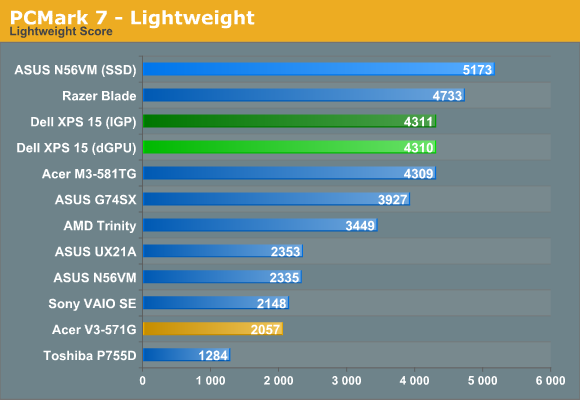
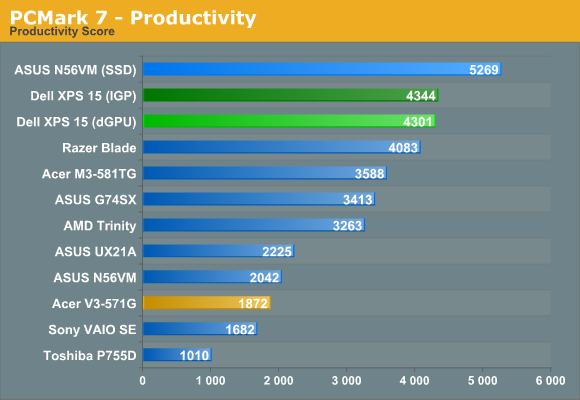
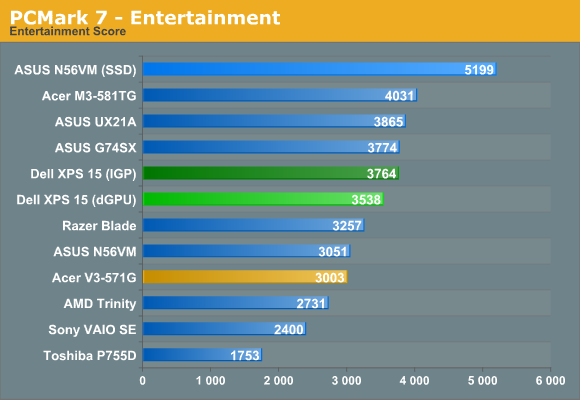
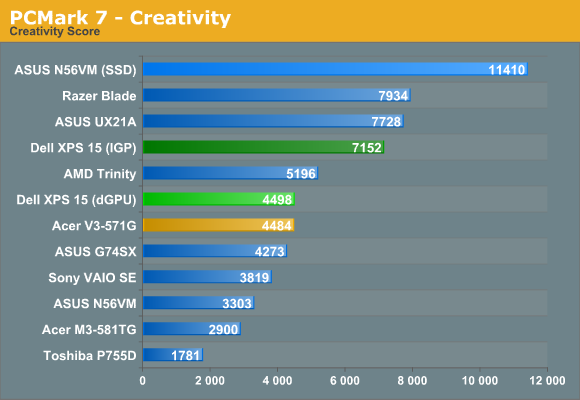
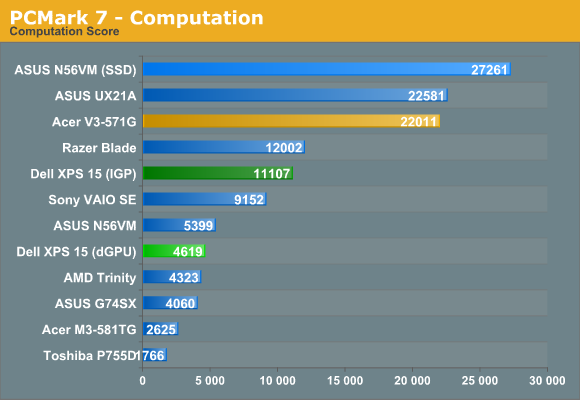
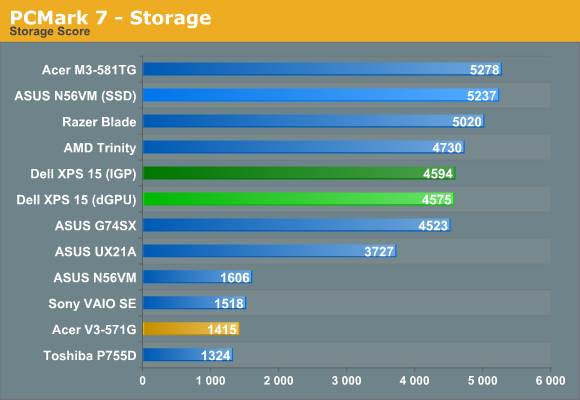
Starting with PCMark 7, our results are actually somewhat surprising. The hybrid Seagate Momentus XT storage in the Clevo W110ER doesn’t improve scores all that much over a typical hard drive (if you can call 25% “not that much”), whereas the 32GB SRT solution in the XPS 15 looks to improve performance by around 75% over an HDD. Of course, if you make the switch to a pure SSD solution (e.g. look at the N56VM scores), PCMark 7’s overall score improves by 135%. That pretty much establishes the expected storage hierarchy: SSD > HDD + SSD Cache > Hybrid HDD > HDD.
There are a few other oddities in the PCMark 7 results worth noting. Both the Creativity and Computation suites benefit tremendously from Intel’s Quick Sync technology. For whatever reason (we tried both the 2696 and 2761 Intel drivers, with similar scores in both cases), the XPS 15 results don’t seem to be in line with other Ivy Bridge laptops. In particular, note how the other three IVB laptops (N56VM, UX21A, and V3-571G) all post Computation scores in excess of 20000, while the XPS 15 has to “make do” with a score of only 11000. This may be yet another instance where throttling is affecting the results, so we’ll wait for updated firmware before trying to draw any final conclusions.
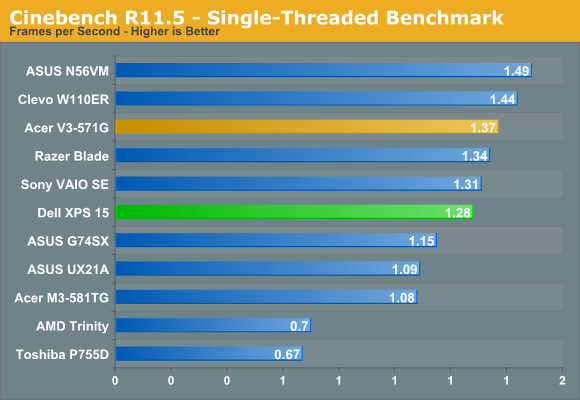
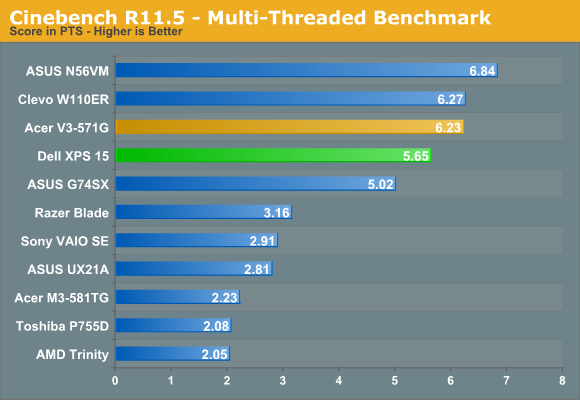
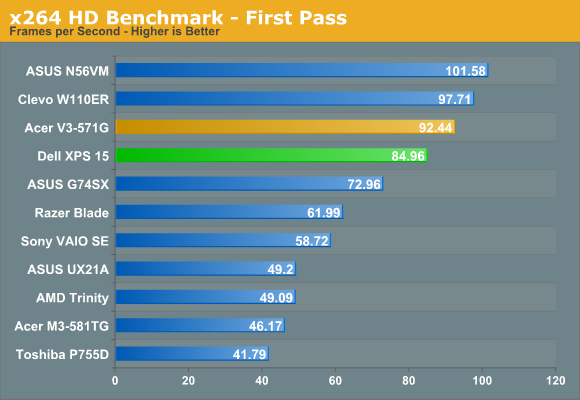
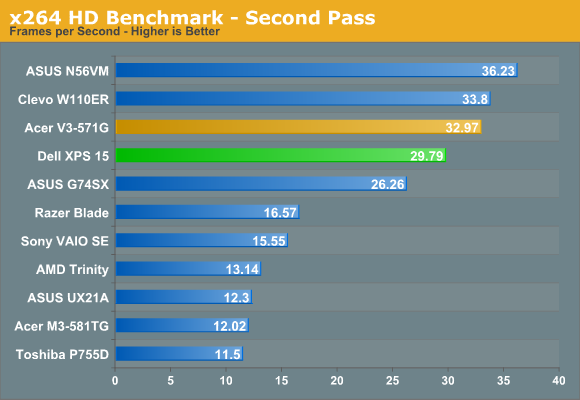
Our CPU-centric tests put the XPS 15 and its 35W i7-3612QM right about where you’d expect. It’s faster than any dual-core processor and outperforms the quad-core Sandy Bridge chips, but it’s a slight step down from the standard voltage 45W IVB quad-cores. Throttling of CPU clocks did not occur during these tests, so it’s only when the CPU and GPU are carrying a significant load the throttling is triggered. As far as we can tell, with the current A04 BIOS, the Dell XPS 15 can pretty much loop a workload like the Cinebench SMP test indefinitely and remain at the maximum Turbo Boost clock (though that may change with updated firmware).
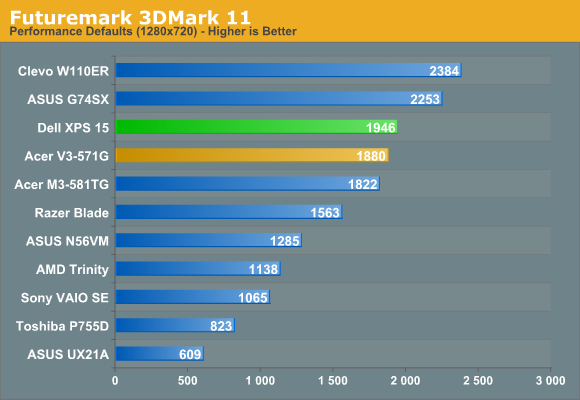
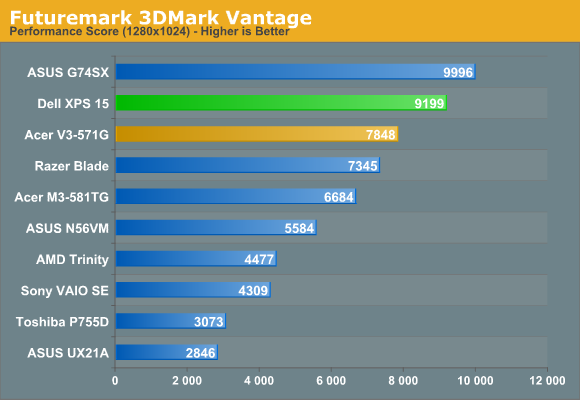
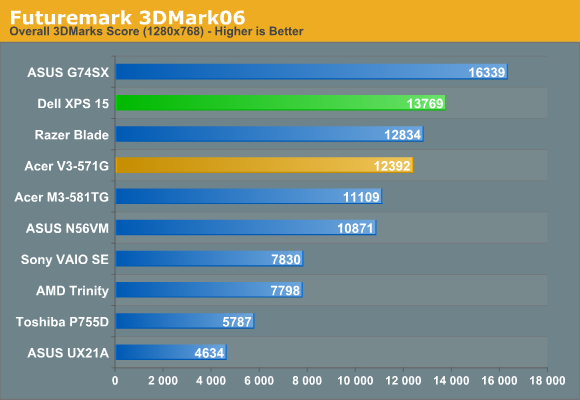
3DMark results also put the XPS 15 and its GDDR5-equipped GT 640M right where you’d expect. It’s a step up in performance over the DDR3-equipped GT 640M in the Acer V3-571G, and it also beats the previous generation GT 555M in the Razer Blade. Meanwhile, the GTX 560M can still win in our synthetic graphics tests, and the GT 650M with GDDR5 also outperforms the XPS 15. There are no real surprises here, but as noted several times already, throttling may be affecting these results—and it’s definitely a factor in the gaming results, which we’ll get to next.










109 Comments
View All Comments
air_ii - Thursday, July 26, 2012 - link
Given current fan / throttling profiles, wouldn't it be interesting to see gaming performance of a throttled i7/GF vs nominal (or perhaps turboed?) IGP performance? Perhaps the GF is completely pointless under circumstances?TC2 - Thursday, July 26, 2012 - link
The best for the Best :) It's an excellent machine!TheTechSmith - Thursday, July 26, 2012 - link
"And on a related note, I should mention that I’ve seen at least some minor throttling with several other “thin but fast” laptops, so Dell’s not alone here; we’ll be making a concerted effort to check for throttling on all future laptop reviews."Yes! I think this is a great idea. I've believed for years that laptops like the one that you just reviewed have been slapped together without proper thermal design (lack of the required mechanical knowledge, reluctance to put in the required money/time?) in order to sell it on specs, and the end result is terrible, and I don't think there is enough awareness on this issue. I posted a little earlier on my XPS M1330 which is a 4 year old computer with the same issue. If reviews start testing for this specifically and compare laptops quantitatively against other laptops (temperature and average frame-rate of select games over time?), then perhaps companies that are poor in this area will hire the required mechanical engineers and dedicate the proper money and time to do it right.
SovereignGFC - Thursday, July 26, 2012 - link
On page 7, it was noted the laptop shut down under load after ThrottleStop was used to force it to run at a specified speed rather than the BIOS-controlled throttled speed.According to Intel (http://ark.intel.com/products/64901), this CPU is rated for a TJunction (maximum core temperature) of 105C. The CPU only hit 100C during these tests, so that implies to me that CPU temperature, while VERY high, was within spec and should not have triggered a shut-down.
If the GPU hit its limit, that's a different story.
However, as an owner of an XPS1640, well-known for behaving similarly, I have to ask whether the A/C adapter Dell shipped is adequate for such a powerful machine. The A/C adapter was sized based on the machine being throttled, not unlocked the way ThrottleStop will permit it to run. I can offer at least one anecdote (many more can be found on NotebookReview's forums) about A/C adapter vs. thermals. This throttling was present in the Latitude E6X00 series of professional notebooks, one of which is owned by a friend. After showing him how he wasn't getting the performance he paid for, he un-throttled his CPU and ran Prime95 to test its thermals.
The machine shut down in a few minutes and the A/C adapter was too hot to touch for a while afterward.
Many XPS1640 owners reported that calling Dell, mentioning "throttling" and asking for a 130w A/C adapter allowed their machines to run properly under "full load." Even though components would be subjected to high heat (I've seen 103C on my Core 2 Duo, 88C on the GPU) they would also receive enough energy to operate as designed, rather than stressing or even destroying the A/C adapter in the process.
JarredWalton - Thursday, July 26, 2012 - link
I can't test this right now, but the thought that we might be exceeding the power limit did cross my mind. I don't think that's the case, however, as there are various triggers that can cause a system to shut down. I'm guessing Dell defined a maximum temperature of some other component, or that something on the motherboard is overheating. I'll look into power draw when I return home next week.SovereignGFC - Thursday, July 26, 2012 - link
Thanks.What annoys me the most is that we get these half-crippled machines that emphasize form over function. I don't care if it looks like a brick--it's a gaming machine and gaming machines need to dissipate huge amounts of heat.
http://forum.notebookreview.com/dell-xps-studio-xp... - That's a massive discussion about heat/power throttle on the 16XX series.
http://forum.notebookreview.com/dell-xps-studio-xp... - People are already talking about the L521X negatively, "it throttles so badly under a realistic gaming load that I'm returning it."
That said, I don't see any "load" (power) related throttling mentioned.
CeriseCogburn - Sunday, July 29, 2012 - link
Yes, good points.Doesn't matter if this site's is under performing from the lack of adequate ps as that is what end users will be receiving, except in the sense it would be nice to know. It certainly wouldn't surprise me if it was. I doubt they're going to purchase a 130W universal adapter to find out.
Great points, I agree with you, the insane emphasis on looks bothers me as well - it's even worse in discrete video cards, as you won't be staring at them as you game - with a laptop I can excuse quite a bit of it - as you will be looking at it a lot.
SovereignGFC - Monday, July 30, 2012 - link
If enough people complain (like the XPS 16), Dell will give out 130w adapters like candy, even though by themselves they did not solve the problem with the XPS 16. Only completely cutting the BIOS out of the CPU equation and replacing it with ThrottleStop let my laptop run like it was supposed to.If tests on sites like Anand say "This laptop needs MO' POWAH!" then Dell will probably jump at a cheap "fix." I'm not saying we know for sure a larger adapter is required (that's what the tests will be for) but experience suggests power may be a factor.
JarredWalton - Thursday, August 9, 2012 - link
Just to update (and spoil the surprise): I plugged the XPS 15 into a 135W Dell adapter; throttling still occurs just as quickly as before, so it's not a power adapter problem.JNo - Thursday, July 26, 2012 - link
I think the Acer M3 looks might tempting value when looking at the graphs. It's got about 90% of the power for about 50% of the price. Sure it's not all about specs and Acer's build quality and looks are nowhere near that of the Dell but I can't ignore that price differential.So what are you really missing out with the Acer? Two things spring to mind: 1) no SSD - easy; buy your own and clone the HDD and you're still alot cheaper than the Dell with your own preferred brand and size of SSD. 2) The rubbish 1366x786 TN panel on the Acer. This is much trickier I prefer lower resolutions for games anyway but 1650x800 or 1080p would be much better for work. Only question is, can you buy and fit a better panel yourself cheaply if you're willing and able?